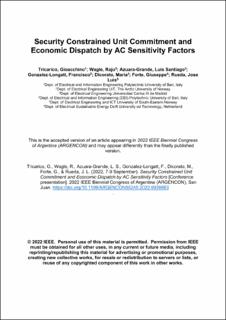Security Constrained Unit Commitment and Economic Dispatch by AC Sensitivity Factors
Tricarico, Gioacchino; Wagle, Raju; Azuara-Grande, Luis Santiago; Gonzalez-Longatt, Francisco; Dicorato, Maria; Forte, Giuseppe; Rueda, Jose Luis
Original version
Tricarico, G., Wagle, R., Azuara-Grande, L. S., Gonzalez-Longatt, F., Dicorato, M., Forte, G., & Rueda, J. L. (2022, 7.-9. september). Security Constrained Unit Commitment and Economic Dispatch by AC Sensitivity Factors [Conference presentation]. 2022 IEEE Biennial Congress of Argentina (ARGENCON), San Juan. https://doi.org/10.1109/ARGENCON55245.2022.9939863Abstract
The dispatch schedule of the electrical power plant units is the result of the solution to the unit commitment optimisation problem, and it minimises the cost of production considering pre-defined technical limits. The security-constrained unit commitment problem has been defined as including the network constraints in the previously mentioned optimisation problem to obtain a feasible power system solution. The traditional security-constrained unit commitment methods are based on the DC-power flow model, where the network losses and voltage magnitudes are neglected in the problem formulation. This paper proposed a bi-stage security-constrained unit commitment with an economic dispatch (SCUCED) optimisation problem. A merit-order-based zonal day-ahead market problem is solved in the first stage to define a preliminary generation commitment. In the second stage, the SCUCED is solved based on the AC-power flow model and sensitivity factors to embed the full network representation in the optimisation problem. In this paper, the proposed method is illustrated by an application to a modified version of the IEEE 39-bus test system.
